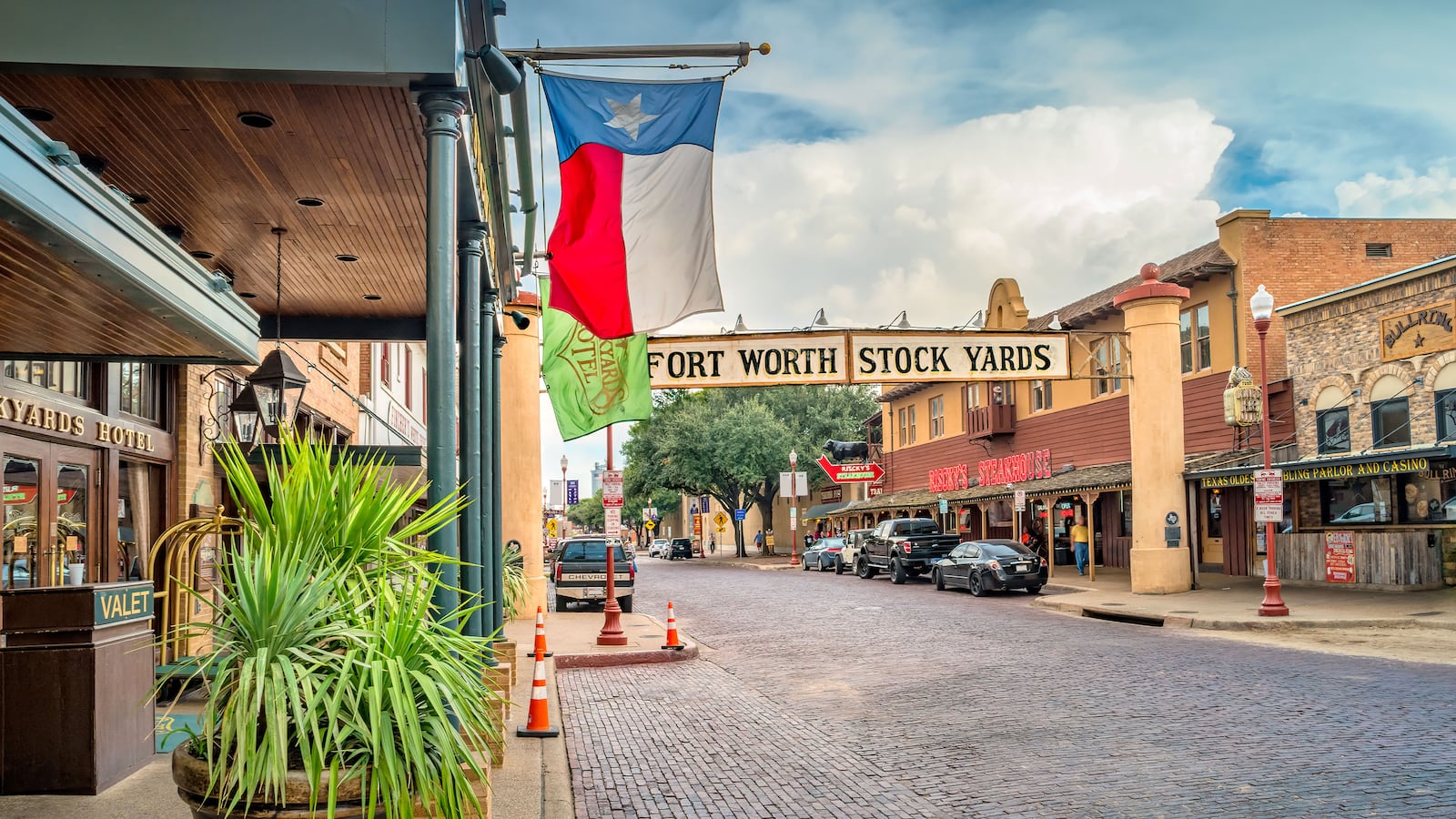For me, Fort Worth was always an afterthought of Dallas Fort Worth Airport, and a part of Texas I never believed I’d never visit. I currently live in Austin, but it’s rare I see a cowboy hat worn unironically, and there are now more Teslas than trucks in this part of the state. It’s Texas-Lite, and Fort Worth, I’d heard, is about as Texas as it gets.
They say the city possessed every Texas stereotype there is. And upon visiting, I found this to be true. The city is rich from oil. It is full of people wearing cowboy boots and hats and sporting shiny belt buckles. Steak is on every menu. There are horses, rodeos, country music, margaritas, and around every corner, the lingering scent of barbecue.
But again and again, I found myself asking: What’s so wrong with that?

A view of West 7th Street Bridge and downtown Fort Worth
Joe Daniel Price/Getty ImagesLocated in North Texas, the now 13th most populous city in the country is just a 30-minute drive from the airport and from Dallas. The city is characterized by sprawling lowlands, grassy plains, and Western architecture. Driving into the city, one can’t help but be amazed at the sheer number of bright green, perfectly mowed lawns, the Ford F-150s humming at every light, and the brick buildings, now restored to make it seem like a ghost town with new life.
Fort Worth goes by many names and this is the best tribute to how strange and fluid the city is: Panther City, Funky Town, Where the West Begins, to name a few. However, prior to all of these names, it was an essential stop for cowboys driving cattle up north. And prior to that, a fort for homestead protections, developed after Texans reneged on two treaties, one with Mexico and another with Native Americans.
An aspect of Texas history that should surprise no one.
Today, the best way to describe the city is as filled with an air of chivalrous debauchery (which the more I consider it, might have always been true). A strange cowboy culture lingers under every move. There’s kindness and hospitality to be found wherever you roam, yet drunken fun is never out of earshot.
I was fortunate enough to stay at the Hotel Drover, a Marriott Autograph property. The hotel is a masterpiece of Western decor, ambience, and hospitality. According to a local, Marriot spent a small fortune on each room in the hotel (of which there are 200). Each room is outfitted with custom leather furniture and Western artworks—the desk was covered in cowhide, and adorned with rich leather, and the couch, a custom dye, handsewn piece.
In the lobby, 10-foot pillars, wrapped tightly in leather, announce that this is no ordinary hotel. And the longhorn skulls hanging above the fireplace take it a step further. But it only gets more special when you venture outside. The Hotel Drover, aptly named for cattlemen who drove cattle up the Chisholm trail through Fort Worth, is located smack dab in the center of the Fort Worth Stockyards.

Billy Bob's is the largest Honkeytonk in the world.
Wikimedia CommonsThe Stockyards developed into a major livestock marketplace during the cowboy era. Now, the area is all hat and no cattle, which I say in the best possible way for travelers like myself. It’s a rodeo-adjacent location adorned with luxury shopping, and upscale restaurants, the perfect place to live out your cowboy fantasies. Six Texas Longhorns meander through the streets during the twice daily cattle drive. But more interesting than the cattle drive is watching some of the most flamboyant boots swaggering down the brick-laden main-street.
This is the place to buy them, too, if that’s your thing. Take for example, Proper Supply Co., a great spot to get custom fitted for a cowboy hat. The store also has artisanal goods from the area, like Bohlin belt buckles crafted for every celebrity in a Western film you could think of. Lucchese bootmakers also has its flagship store just steps away. You can get custom fitted for a pair of cowboy boots, but again, even if Western wear isn’t your style—it’s not mine—the brand has beautiful leather goods spanning wallets, belts, and more.
You can find the best people watching, and the best time, over at Billy Bob’s, the largest Honkeytonk in the world (naturally). Opened in the 1980s, it’s a classic Texas dancehall, complete with pool tables, a floor for line-dancing, and neon beer signs galore. Instead of signatures, famous singer songwriters put their handprints into concrete. It’s like the Texas version of Hollywood’s Chinese Theater.
While you could spend a few days at the Stockyards line dancing, sitting by the pool, and shopping, it is only part of the sprawling city of Fort Worth. You might not expect it (I didn’t) but Fort Worth boasts an incredible museum scene that is still blooming.
Within the city’s cultural district is the Modern Art Museum, a beautiful space with a moat surrounding its glass walls, that is filled with Kehinde Wiley’s, among 3,000 other post WWII works. On a more Western note, there is also the National Cowgirl Museum and Hall of Fame, the only museum dedicated to honoring the women of the West, the John Wayne Museum, and the nationally renowned Kimbell, which is a must for architecture lovers.

The Modern Museum of Art Fort Worth
Wikimedia CommonsAnd outside of the Stockyards, there’s more than chicken-fried steak and Tex-Mex to indulge in (although get both of those things while you’re here). Most notable is Don Artemio, which was recently named a James Beard Award Semi-Finalist, and serves some of the best Mexican food I’ve eaten outside of Mexico. While the restaurant is famous for its cabrito, a can’t-miss is the nopales, which are spiralized, then fried. Put inside a fresh corn tortilla with some guacamole, each bite is crispier than a potato chip.
While the food was delicious, the design was somehow even better. All of the bricks were made in Saltillo, and brought into Fort Worth. The restaurant is adorned with looms, as Saltillo is famous for sarapes, and clay pots filled with plants local to the region help encircle a lovely outdoor dining area.
Here’s the bottom line: Fort Worth is chock full of every Texas stereotype. From queso to margaritas, to cowboy boots, and belt buckles, it is the place to go to experience the wealth of the Lonestar state in its truest form.
But with all of that said, lurking under the tide of cowboy cosplay is a real sense of culture, a burgeoning art scene, food worth traveling for, and hospitality that’ll make you feel at home. And besides, don’t kid yourself: Sitting by a ranch style pool and sipping a margarita, well, that’s about as good as it gets.

